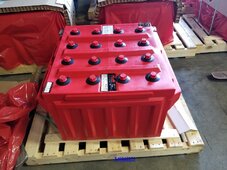dktool
New Member
This is a strange one to me ...
Lifepo4 200ah battery connected to a 2200 watt true sine wave inverter via a #1 awg cable, total cable length out and back is @8' with a 250 amp breaker located about 1' from the inverter, I know, should be close to the battery not the load....but, here's the weird thing.
With a 800 watt load all is good, with a 1500 watt load the inverter shuts down after about 30 seconds.
Voltage never drops below 12.5 as shown on the inverter remote panel as well as the battery bluetooth which shows slightly higher, when it shuts down there is no hiccup in voltage or amperage and the breaker does not trip.
If I connect a jumper (10 ga) from the input side of the breaker to the input on the inverter it does not shut down with a 1500 watt load.
The jumper is carrying @35 amps bypassing the breaker.
It seem obvious the breaker is funky but to have it not show obvious voltage drop across it or trip is just seems strange.
Any logic anyone can add to this ??
Lifepo4 200ah battery connected to a 2200 watt true sine wave inverter via a #1 awg cable, total cable length out and back is @8' with a 250 amp breaker located about 1' from the inverter, I know, should be close to the battery not the load....but, here's the weird thing.
With a 800 watt load all is good, with a 1500 watt load the inverter shuts down after about 30 seconds.
Voltage never drops below 12.5 as shown on the inverter remote panel as well as the battery bluetooth which shows slightly higher, when it shuts down there is no hiccup in voltage or amperage and the breaker does not trip.
If I connect a jumper (10 ga) from the input side of the breaker to the input on the inverter it does not shut down with a 1500 watt load.
The jumper is carrying @35 amps bypassing the breaker.
It seem obvious the breaker is funky but to have it not show obvious voltage drop across it or trip is just seems strange.
Any logic anyone can add to this ??




